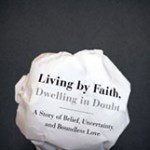Lectionary Reflections for October 27, 2013
Joel 2:23-32; Psalm 65; 2 Timothy 4:6-8, 14-16; Luke 18:9-14
Anne Lamott asserts that the essential elements of prayer are “Help, Thanks, and Wow.” Today’s readings involve a litany of praise – a spiritual “wow” at the many ways God moves in our lives and the world. God is always at work faithfully in the microcosm and macrocosm and the human and non-human. The only response we can make to God’s ubiquitous grace is praise.
Joel praises God for a new era, a time of restoration, for the nation and its citizens. In the midst of destruction, an image of hope emerges. A new beginning is promised that is more than political, financial, or agricultural. It is spiritual and embraces the whole nation. The words of Joel 2 echo through history: they constitute the heart of Peter’s Pentecost speech. In amazement at God’s emerging vision, Joel dreams of an age in which divine revelation is ubiquitous and unrestrained: God’s coming revelation breaks down all social, economic, and sexual barriers. Even the marginalized become the emissaries of grace. There are a multiplicity of revelations, diverse in nature yet suited to each person.
Joel affirms a democracy of revelation and salvation. In contrast to Jewish exclusivism, Calvinist predestination, and contemporary Christian dominion thinking, Joel asserts that there are no chosen people; rather all who call upon God are saved. God’s bias is toward wholeness and salvation for all, but our calling is to open the door to grace. Out of an abundance of restoration and renewal, and revelation and salvation, praise abounds.
Psalm 65 is a psalm of “wow.” Psalm celebrates the structure and beauty of the universe. It provokes what Abraham Joshua Heschel describes as “radical amazement.” God’s energetic love flows through all things, inspiring a global song of praise. All things reflect divine artistry, wisdom, and beauty. Creation, both human and non-human, is the primary and most intimate revelation of God. In the spirit of Psalm 150, everything praises God: out of beauty and vibrancy, praise abounds.
2 Timothy proclaims the grace of God’s protection. At the descending edges of life, “Paul” gives thanks for all that God has done for him. God is the source of protection and deliverance. The grace of God has protected the apostle in the “many dangers, toils, and snares” of life and God will “lead him home.” From divine protection and sustenance, grace abounds.
The parable of the Pharisee and the Tax Collector describes an unexpected grace, the grace of interdependence. Caught up in his self-made goodness, the Pharisee closes the door to the grace of interdependence on a power more loving than himself. In contrast, the Tax Collector knows that he cannot survive apart from divine gracefulness. He throws himself on God’s mercy, knowing that mercy alone can save. Alone, the Tax Collector and we are lost. Standing on our own, all is lost: there is no room for Ayn Rand in Christian theology, community, and politics. Out of dependence emerges creativity; out of agency emerges adventure. God is near, but awakening and accepting God’s nearness is our only hope and only help.
I use the phrase “grace of interdependence” here because I believe that grace is grounded in an open system and not a zero-sum approach to life. Grace does not preclude agency and creativity on our part. In this regard, both Augustine and Pelagius are both right: grace is always prevenient and life-transforming; it comes to us apart from our efforts or any actions on our part. On the other hand, grace comes to us as God’s movement within our lives, and not an external, alien reality; grace evokes creativity and responsibility and gracefulness in response. We cannot live without grace, but grace comes to God’s beloved; God never sees us as depraved and lost. Our essential God-created goodness makes it possible to experience God’s saving grace.
Doxology bursts forth: with Al Carmines, “for the giver, for the gift, praise, praise, praise.”

















